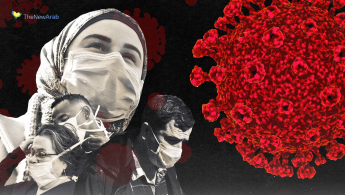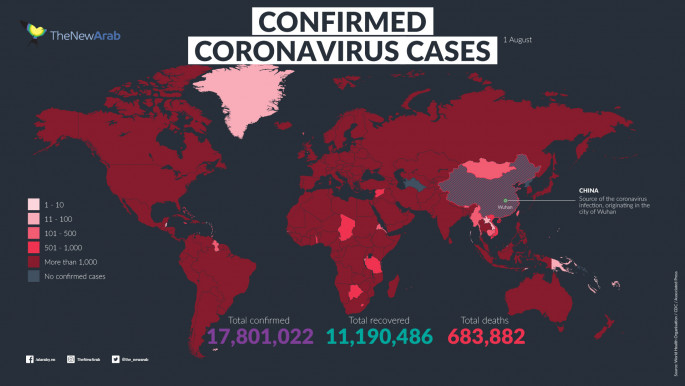The Middle East at war with coronavirus: Top stories from 12 April
1. Muted Easter Sunday celebrations in Jerusalem
Only a handful of priests celebrated Easter on Sunday at the Church of the Holy Sepulchre, built on the site where Christians believe Jesus was crucified and resurrected.
In the heart of Jerusalem's Old City, the church - which had not been closed over Easter for at least a century - has been shuttered to worshippers along with all cultural sites in the Holy Land to curb the spread of Covid-19.
"Easter is a time for life," said Archbishop Pierbattista Pizzaballa, apostolic administrator of the Latin Patriarch of Jerusalem, who arrived at the church under the watchful eye of Israeli security forces.
"Despite the signs of death everywhere, life will prevail as long as someone is giving life out of love for others," he added, before entering the church.
The Sepulchre is considered the holiest site in Christianity, and it typically attracts thousands of worshippers over the Easter weekend. Read more here.
Twitter Post
|
2. UAE offers online nuptials in face of lockdown
The United Arab Emirates has launched an online marriage service that allows couples to wed amid restrictions on movement and interaction imposed to counter coronavirus.
The service was launched "to maintain the health of the public and that of people working in courts and to limit the presence of employees", WAM reported. Read more here.
3. Iranian soldiers quarantined in eastern Syria
Some 40 members the Iran-led Islamic Revolutionary Guards Corps (IRGC) militia fighting alongside Bashar al-Assad's regime in Syria have been taken to hospital on suspicion of having contracted the coronavirus, according to local monitoring site Eye of the Euphrates.
Some 25 militia fighters of Iranian and Afghan nationality stationed in the city of Al Bukamal were taken to hospital in the city of Deir az-Zour in eastern Syria after they reportedly began showing symptoms of Covid-19.
A further 15 soldiers were handed over to Iraq's paramilitary force the Popular Mobilisation Forces (PMF) and transferred to a facility in neighbouring Iraq.
Medical staff in local hospitals have allegedly been threatened by soldiers against revealing the true number of Covid-19 cases, while activists claim the regime has orchestrated a cover-up of the full extent of the virus in Syria.
Rumours had circulated weeks before Syria officially confirmed its first coronavirus last month that foreign pro-regime fighters had already transmitted the virus into the ranks of the Syrian regime army.
However the regime still maintains the figures are low, announcing a further six cases on Saturday, bringing the total to 25, two of whom had died.
Thousands of IRGC forces and paramilitary volunteers from Iranian, Afghan and Pakistani Shia groups are thought to be fighting in Syria, many of them stationed on the southern and southeastern border in Deir az-Zour province, where Islamic State militants still operate in pockets. Read more here.
4. Egyptian officials begin to broker prisoner swap between Israel and Hamas
 |
|
| Click to enlarge |
The Israeli government has enlisted Egyptian officials to mediate with Hamas, showing its intention to advance negotiations with Gaza's rulers over a prisoner exchange due to the Covid-19 pandemic.
If finalised, the deal could see Hamas disclose information on the status of the four Israelis currently held in the Gaza Strip in exchange for the release of vulnerable Palestinian prisoners from Israeli detention.
Israel has demanded that Hamas accept its conditions for the deal, which would then be implemented gradually over several months, to ensure that the Palestinian factions invovled to not stage any kind of escalation such as rocket strikes. Read more here.
5. Gulf countries criticised for mass repatriation of migrant workers
Advocates for migrant and workers' rights have spoken out against mass repatriation programmes for migrant labourers - including those with Covid-19 symptoms - being carried by Saudi Arabia and the UAE.
Saudi Arabia has reportedly deported 2,968 Ethiopian migrants in the first 10 days of April, despite the country's makeshift quarantine facilities for returnees becoming dangerously overcrowded.
Meanwhile, the UAE threatened to review labour ties with countries refusing to take back their citizens, including those who had lost jobs or been put on leave.
"This is simply not the moment for mass deportations from a public health perspective," Catherine Sozi, the UN humanitarian co-ordinator for Ethiopia told the Financial Times. "These mass deportations, without any pre-departure medical screening are likely to exacerbate the spread of Covid-19 to the region and beyond."
Coronavirus has spread among the Gulf's millions of low-wage foreign labourers, many of whom live in overcrowded shared accommodation.






 Follow the Middle East's top stories in English at The New Arab on Google News
Follow the Middle East's top stories in English at The New Arab on Google News
![Israeli forces ordered bombed Gaza's Jabalia, ordering residents to leave [Getty]](/sites/default/files/styles/image_330x185/public/2176418030.jpeg?h=a5f2f23a&itok=_YGZaP1z)

